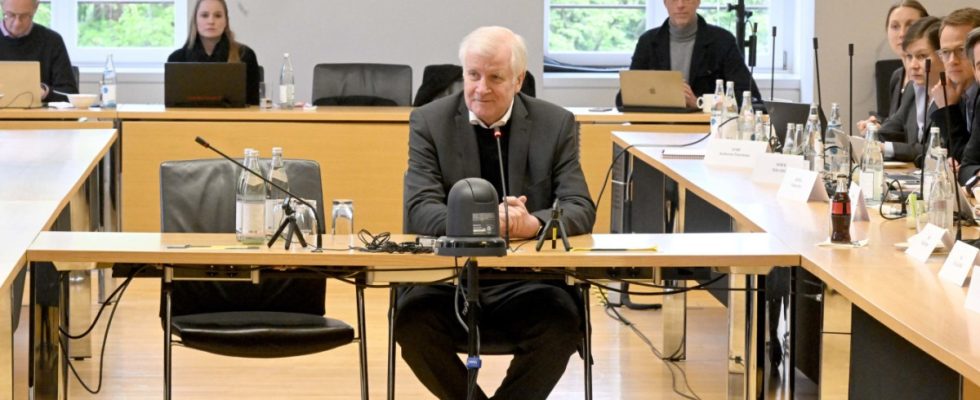It’s a bit like before. Horst Seehofer marches through the hall of the state parliament and the cameramen are already waiting for him. He greets you, turns left and enters the White Rose Room. When was the last time he was in the state parliament? “I didn’t say anything for five years and I wasn’t there either,” says Seehofer. But now he’s back. And have to say something. At 2:06 p.m. he takes a seat and presses the button on the table microphone. A red light turns on. Let’s go.
Seehofer, 73, is a witness in the investigative committee for the Nuremberg Museum of the Future, which, among other things, deals with the suspicion of wasting taxes. The official reading of this Friday is: What role did Seehofer play? In fact, the media interest also has something to do with the fact that a man appears here who has largely withdrawn from the public eye. In addition, the museum is a prestige object of Markus Söder, Seehofer’s former rival and successor as Prime Minister.
Anyone expecting Seehofer to use the U-Committee as a stage for revenge will be disappointed. Seehofer said at the outset that he was “extremely satisfied” with the museum project, which began when he was prime minister. He has “nothing to criticize about any minister” – not even about Söder, whom Seehofer made finance minister in 2011 and in 2014 also home minister. When he set up the ministry, there was a great deal of ridicule, especially when Seehofer accidentally called the house “Heimatmuseum”. Well, in the U-Committee, he actually says “Ministry of the Future” instead of the Museum of the Future. Very funny.
The state parliament opposition consisting of the Greens, SPD, FDP and also AfD are convinced that Söder, as finance minister, pushed through the museum in his hometown without regard to costs and thus gave Gerd Schmelzer, the landlord of the museum building, a brilliant deal. The Free State pays more than 230,000 euros a month, contract duration 25 years. The Seehofer cabinet had decided on the plans for the museum project as part of the North Bavaria Initiative, a funding program for Franconia and the Upper Palatinate.
Seehofer calls the initiative “perhaps the most central work in Bavaria this century”. This is obviously a man who not only protects his successor, but above all his life’s work. At the future museum he “knew that it would be expensive”. But if a measure “does something positive for people, then we have to pull out all the stops to ensure that it is implemented,” says Seehofer – and makes it clear that he sees it very similarly at the Munich Konzerthaus and at the second Munich S- Bahn-Röhre, there is also a sub-committee running there. It’s unfortunate “that I’m not invited to the regular route committee,” says Seehofer with a smile.
He chatters and chatters like in the old days. About his life as a politician (“wonderful time”), his life as a pensioner (“beautiful life”) and about the government dreams of his daughter Susanne Seehofer, who is running for the FDP in the state elections in autumn (“It doesn’t look as good as she hopes”) . And he praises the fact that Söder “standed up for his hometown” and fought for the future museum as home minister, who was not “responsible for potatoes and bananas”.
At the museum there is “total agreement” with Söder
It would be wrong to accuse Seehofer of any zeal for exposure. There are numerous indications that Söder was a driver of the Museum of the Future, even if the Ministry of Science was responsible. Robots, artificial intelligence, everything Söder’s heart topics. And it is undisputed that the museum deal was not a cheap deal for the Free State. In an interim conclusion of its review, the Supreme Court of Auditors (ORH) described the lease as “landlord-friendly”. So expensive, but too expensive? No, that is the conclusion of two expert reports that were recently published. There is talk of “customary” and “plausible” conditions.
Seehofer says that he “didn’t agree for life” with Söder. But at the museum there was “total agreement”. That the opposition senses nepotism because landlord Schmelzer regularly donated to the CSU? “We didn’t have cronyism,” says Seehofer about his former cabinet. In the U-Committee, Schmelzer also said that Söder had no influence on the location decision – and rejected all allegations.
“You don’t want something like that, such jumps in costs,” says Seehofer about price increases for important projects. But some things are just “unavoidable”. And in the end, says Seehofer, there is also “our imperfection, with which the Lord God put us into the world”.

